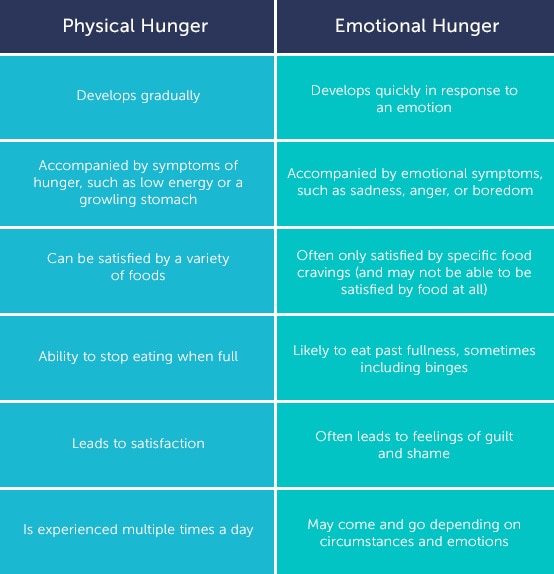[vc_row][vc_column][vc_column_text]If you feel like you’re hungry all the time, you’re certainly not alone. While most people enjoy eating, experiencing extreme or constant hunger can be frustrating, especially if it frequently interrupts your day.
Here we will help explain what may be causing your frequent hunger, and what you can do about it.

Always Hungry? This Could Be Why.
Hunger is your body’s signal that you need more
food. Your stomach may feel empty or unsatisfied, and you may experience hunger pains or a growling stomach. If hunger persists for long enough, you may also feel notoriously “hangry,” which is when hunger and anger combine and can make you feel irritable.
There could be many different reasons why you’re hungry all the time.
Imbalanced diet
The types of foods you eat can make a big impact on your hunger levels. Eating
nutrient-rich foods that are high in fiber and protein are likely to keep you full for longer compared to foods that do not provide enough of those nutrients. Having an imbalanced diet can also cause your blood sugar to drop more quickly after eating, and low blood sugar will also trigger more hunger.
Fast metabolism
Your
metabolism is the rate at which your body burns calories. If you have a very fast metabolism, you are likely to feel hungrier since your body needs more fuel to keep it functioning properly.
Poor sleep
Your appetite is closely linked to how much sleep you get. Being sleep deprived
alters the hormones that regulate your appetite and often causes an increase in how much food you consume.
Active lifestyle
Physical activity burns calories, which need to be replenished by eating food. Even if you’re not working out at a gym, you may be more physically active than you realize. This is especially true if you have an active job, you’re caring for young children or running errands all day long. Having a high muscle mass also burns more calories and can make you feel hungrier.
Chronic stress
In the short term, stress can decrease your appetite. But if stress persists, it often increases hunger levels. This is because chronic stress increases the amount of the hormone
cortisol in your body, which can
increase your appetite and cravings for certain foods.
Being dehydrated
Thirst is often disguised as hunger. If you’re not
drinking enough water, you may find yourself feeling hungrier than usual.
Eating too fast
It takes your brain about 20 minutes from the time you start eating to send your body signals that you are full. If you eat too quickly, you may not be giving your brain enough time to register fullness cues and may feel like you’re still hungry even after eating a full meal.
Not eating foods that satisfy you
Different foods will satisfy you in different ways. If you’re frequently eating foods you don’t like or which are too low in calories or other nutrients, you are likely to not feel satisfied and may continue to feel hungry until you do eat something satisfying.
Increased energy needs
Certain life stages, such as during pregnancy, breastfeeding and growth during childhood and adolescence can increase your need for more calories, often triggering more hunger.
Some health conditions
Health conditions such as having a hyperactive
thyroid, known as hyperthyroidism, can increase your body’s metabolism and make you hungrier than usual. You should always talk with your doctor if you feel you may have a health condition that is impacting your appetite.
Taking certain medications
Some medications can cause an increase in appetite. Talk with your healthcare provider if you’re concerned about any of the medications you take.
What You Can Do About Constant Hunger
Being hungry all the time isn’t always a cause for concern. In many cases, the best thing you can do is to satisfy your hunger with nutritious foods. Things like appetite suppressants are never recommended and can be unsafe.
If your hunger is concerning to you, though, and is causing you to gain unnecessary weight or contribute to other health issues, here are some natural things you can try to help get it under better control:
Modify your diet.
A well-balanced meal or snack should leave you feeling full for at least 2-3 hours. If it’s not, consider switching up what you’re eating. Protein has been shown to
impact levels of fullness more than carbohydrates or fat. Fiber, found in foods like whole grains, produce,
beans and
nuts also
contributes to fullness and satiety more so than low fiber carbohydrates.
Get more (or better) sleep.
Adults need between
7 to 9 hours of restful sleep each night. If you're getting less than this, or if your sleep is frequently disrupted.
Drink more water.
Many people don’t realize they are dehydrated even if they are. If you feel like you’re hungry too often, try drinking about eight ounces of water before reaching for a snack or another meal. While other fluids can also help with dehydration, they often don’t have the same effect as pure water, and some may contribute unwanted excess calories.
Eat to satisfy.
Trying to limit yourself to only certain foods or following strict diets can make hunger worse since the foods often do not satisfy you. In reality, you are likely to eat less if you eat foods that you really want and that contain a balanced amount of protein, complex carbohydrates and healthy fats.
Manage your stress.
This may be easier said than done, but there are many little actions you may be able to take that can add up to significant reductions in your stress levels. Ideas include letting go of some obligations, asking for help and carving out time to do things you enjoy each day.
Slow down while eating.
Try practicing
mindful eating, which involves paying closer attention to your food and eating without distractions. This can help you slow down and enjoy the food more, while also better controlling your hunger. You can read more about the how and why of slowing down while eating in
this article.
Wait it out.
In many cases, excessive hunger is just a phase that may pass. In addition, it is common for your appetite to change over time or even day to day, which you can learn more about
here.
When Hunger is Something More
In some cases, physical hunger can be confused for emotional hunger. While these two sensations may feel similar in your body, one is triggered by a physiological need to eat while the other is triggered by emotions, such as sadness, boredom or anger.
No matter how much you eat, food rarely satisfies emotional hunger. That’s why it can be helpful to understand the differences between the two. If it’s emotional hunger you’re experiencing, try taking steps to deal with whatever is causing the emotion, rather than trying to suppress it with food.
Here’s how to help distinguish between physical hunger and emotional hunger:

There are many possible causes of being hungry all the time. In some cases you may be able to make some diet or lifestyle changes to help get your hunger under better control. In other cases, it is best to simply honor your hunger in a healthy way and wait for this phase of your life to pass. If you’re still concerned about your appetite even after trying some or all of these tips, it is a good idea to speak to a trusted healthcare provider to rule out other possible causes.[/vc_column_text][/vc_column][/vc_row][vc_row][vc_column][vc_text_separator title="Featured Products" border_width="2"][vc_row_inner][vc_column_inner width="2/12"][/vc_column_inner][vc_column_inner width="3/12"][vc_single_image image="165861" img_size="full" onclick="custom_link" img_link_target="_blank" link="https://www.vitacost.com/simple-truth-organic-seasoned-black-beans"][/vc_column_inner][vc_column_inner width="2/12"][/vc_column_inner][vc_column_inner width="3/12"][vc_single_image image="165862" img_size="full" onclick="custom_link" img_link_target="_blank" link="https://www.vitacost.com/zego-organic-oats"][/vc_column_inner][vc_column_inner width="2/12"][/vc_column_inner][/vc_row_inner][/vc_column][/vc_row]
 There are many possible causes of being hungry all the time. In some cases you may be able to make some diet or lifestyle changes to help get your hunger under better control. In other cases, it is best to simply honor your hunger in a healthy way and wait for this phase of your life to pass. If you’re still concerned about your appetite even after trying some or all of these tips, it is a good idea to speak to a trusted healthcare provider to rule out other possible causes.[/vc_column_text][/vc_column][/vc_row][vc_row][vc_column][vc_text_separator title="Featured Products" border_width="2"][vc_row_inner][vc_column_inner width="2/12"][/vc_column_inner][vc_column_inner width="3/12"][vc_single_image image="165861" img_size="full" onclick="custom_link" img_link_target="_blank" link="https://www.vitacost.com/simple-truth-organic-seasoned-black-beans"][/vc_column_inner][vc_column_inner width="2/12"][/vc_column_inner][vc_column_inner width="3/12"][vc_single_image image="165862" img_size="full" onclick="custom_link" img_link_target="_blank" link="https://www.vitacost.com/zego-organic-oats"][/vc_column_inner][vc_column_inner width="2/12"][/vc_column_inner][/vc_row_inner][/vc_column][/vc_row]
There are many possible causes of being hungry all the time. In some cases you may be able to make some diet or lifestyle changes to help get your hunger under better control. In other cases, it is best to simply honor your hunger in a healthy way and wait for this phase of your life to pass. If you’re still concerned about your appetite even after trying some or all of these tips, it is a good idea to speak to a trusted healthcare provider to rule out other possible causes.[/vc_column_text][/vc_column][/vc_row][vc_row][vc_column][vc_text_separator title="Featured Products" border_width="2"][vc_row_inner][vc_column_inner width="2/12"][/vc_column_inner][vc_column_inner width="3/12"][vc_single_image image="165861" img_size="full" onclick="custom_link" img_link_target="_blank" link="https://www.vitacost.com/simple-truth-organic-seasoned-black-beans"][/vc_column_inner][vc_column_inner width="2/12"][/vc_column_inner][vc_column_inner width="3/12"][vc_single_image image="165862" img_size="full" onclick="custom_link" img_link_target="_blank" link="https://www.vitacost.com/zego-organic-oats"][/vc_column_inner][vc_column_inner width="2/12"][/vc_column_inner][/vc_row_inner][/vc_column][/vc_row]




